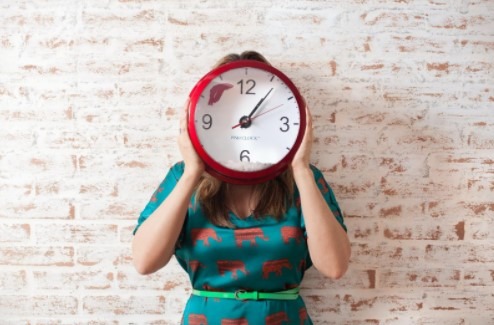Sufficient sleep is necessary to live a healthy life, but too much sleep can be just as harmful as too little sleep. You might’ve noticed that you can’t just fall asleep whenever, even if you’re tired. Lying down can help replenish your energy, but falling asleep at a time you’re not used to often seems close to impossible.
You likely find yourself feeling more drowsy at specific times of the day, in line with your sleep schedule. Even if you pull an all-nighter, you may still find yourself waking up at your regular time the next day, even if your body still needs more sleep. All this evidence begs the question: do people really have an internal clock?

Biological Clock Basics
As the name suggests, your biological clock is a natural mechanism in your body and brain that keeps track of time and even helps you predict it. Your biological clock is affected by factors ranging from microscopic interactions between specific proteins, cells, tissues, and organs in your body, to external environmental input, boredom and levels of activity and exhaustion.
Your biological clock plays the role of the master clock in the brain, giving you your sense of time and coordinating many processes in your body, including your circadian rhythm. The circadian rhythm is one of the many internal clocks in your body and is most responsible for managing your sleep schedule.
Under normal circumstances, with sufficient hours of day and night time, your circadian rhythm runs on a 24-hour cycle, telling your body at what approximate time to fluctuate hormones and wake you up, and when to start pumping sleep and fatigue-inducing hormones for your nightly wind-down.
Chronobiology is the study of the body’s internal clock, including the circadian rhythm. Chronobiologists examine the different timing processes of the human body and how external factors, such as different environmental conditions, medications, and illnesses, can affect them.
What Does the Master Clock Control?
Similar to the clock on your wall or phone that you likely use to plan and control your day, your body’s master clock controls multiple aspects of your body and brain. It is not a single physical structure but rather an interaction between multiple biological components. They affect many different systems and aspects of your body, some of which are:
- Hormone Release- Hormones play a critical role in affecting your physical and mental condition throughout the day. Your body’s master clock is responsible for releasing certain hormones at certain times of the day.
- Sleep- Sleep is also directly affected by the hormones your body releases at specific times of the day. The primary sleepiness-inducing hormone is melatonin. If your circadian rhythm is healthy, your brain releases melatonin in the evening, near your usual bedtime. When your internal clock signals that it’s time to wake up, your body releases serotonin to stimulate and energize you. Regular exposure to sunlight is thought to increase levels of these hormones, making you more awake. You can learn more about sleep cycles at Sleep Science by SleepMoment.
- Body Temperature- When you fall asleep, your body temperature drops. Depending on input from your internal clock, your brain minutely lowers your body’s temperature to let you fall asleep. Most places experience relatively colder weather at night, aiding in this process.
- Eating and Digestion- Around your usual meal times, your stomach releases ghrelin to stimulate hunger and inform your brain that it’s time to eat. After you’ve been satiated, your stomach releases gastrin, a hormone that increases the release of gastric juices and kick starts the digestion process.
What Disturbs Circadian Rhythms?
Your internal clock and circadian rhythms are generated within your body, but they’re not entirely independent and can be affected by aspects of your environment. Here are some external factors that could be disturbing your circadian rhythm:
- Chemical stimuli such as caffeine, sugar, and vitamin C
- The lack of well-separated and sufficiently lengthy periods of light and darkness
- Stress or anxiety due to life circumstances like school, work, or interpersonal issues
- Hormonal imbalance, such as that caused by the onset of menopause
- Physical pain or discomfort due to an uncomfortable sleeping situation
You can fix some of these issues by adopting better sleeping and eating habits and addressing imbalances in your schedule and workload. In other cases, you might need to seek medical or psychological assistance.
Understanding Your Body is the Best Way To Care for It
Your body is a set of complex biological relationships, systems, and organs that work together. When one isn’t working correctly, you can feel the adverse effects on others.
The same applies to sleep. Poor sleep can affect your physical and mental health, and poor physical and mental health could be the reason you’re struggling with sleep.
Once you are aware of the delicate balance between these various systems and realize the importance of keeping a schedule that aligns with your internal clock’s urging, you may see improvements in your health and well-being.
I’m a 20-something stay-at-home mother and wife. I have an amazing husband, a beautiful daughter, two loving dogs, and a lazy cat. I wouldn’t change my life for anything! I love to read, listen to music, cook and blog!

Speak Your Mind